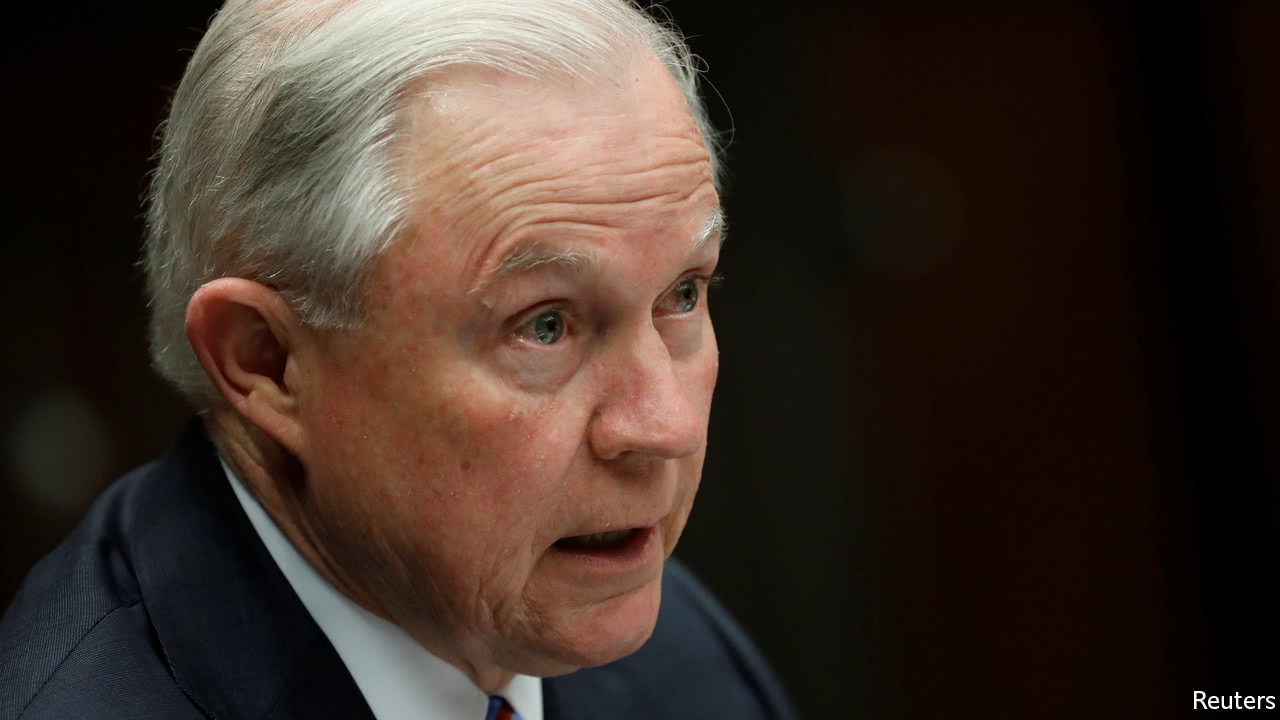The attorney-general’s amnesia

FOR A tense two hours on June 13th Jeff Sessions, the attorney-general, faced questions before the Senate intelligence committee about his dealings with Russian officials during the election campaign last year. He was also questioned on possible ties between President Donald Trump’s entourage and the Kremlin, and his own role in the sacking of James Comey as head of the FBI a few weeks ago.
Initially Mr Sessions was expected to testify behind closed doors but on June 12th Richard Burr, the Republican chairman of the committee, revealed that Mr Sessions would be questioned in an open setting. This was at the request of Mr Sessions, explained a spokesperson of the Department of Justice, because he felt that it was “important for the American people to hear the truth directly from him”.
Latest updates
How the Opera di Roma turned things around
PROSPERO
29 MINUTES AGO
Why the falling oil price isn’t hurting markets
BUTTONWOOD’S NOTEBOOK
2 HOURS AGO
Retail sales, producer prices, wages and exchange rates
7 HOURS AGO
Foreign reserves
7 HOURS AGO
How the euro zone deals with failing banks
THE ECONOMIST EXPLAINS
12 HOURS AGO
The Supreme Court says offensive trademarks are protected speech
DEMOCRACY IN AMERICA
A DAY AGO
See all updates
Millions of Americans who watched or listened to Mr Sessions's testimony, which was broadcast live on National Public Radio and all major cable-news channels, heard his version of the truth. But he did not provide much enlightenment for those who followed the saga of Russia’s alleged meddling in the election in 2016 closely. In response to numerous questions, the attorney-general said that he could not remember or was unable to reply. He insisted he would not discuss his conversations with Mr Trump even though the president had not invoked his executive privilege to prevent such testimony. “Consistent with longstanding Department of Justice practice, I cannot and will not violate my duty to protect confidential communications with the president,” he said.
At the start of his remarks, Mr Sessions made an emotional appeal to his colleagues in the Senate. Any suggestion that he colluded with the Russians or was aware of any collusion between Team Trump and the Russians to influence the election was “an appalling and detestable lie”, he said. “Please colleagues, hear me on this,” he pleaded. Mr Sessions then specifically addressed an allegation that he had met Sergey Kislyak, the Russian ambassador, at an event at the Mayflower hotel in Washington in April 2016:
I did not have any private meetings nor do I recall any conversations with any Russian officials at the Mayflower Hotel. I did not attend any meetings at that event. Prior to the speech, I attended a reception with my staff that included at least two dozen people and President Trump. Though I do recall several conversations I had during that pre-speech reception, I do not have any recollection of meeting or talking to the Russian ambassador or any other Russian officials.
The attorney-general’s denial of a meeting with the Russian envoy matters because, during his confirmation hearing, Mr Sessions had testified under oath that he did not communicate with the Russians in 2016. It later emerged that he had had at least two encounters with Mr Kislyak. This created many negative headlines, which is why many assumed that Mr Sessions swiftly recused himself from the probe into Russia's interference in the election. But in his testimony Mr Sessions claimed that he stepped aside not because of any wrongdoing on his part, but because a regulation of the Department of Justice mandated it. The regulation, 28 CFR 45.2, notes that an employee of the Department of Justice shall not participate in a criminal investigation or prosecution if he has a personal or political relationship with an elected official.
Mr Sessions’s refusal to talk about his discussions with Mr Trump meant that he was unable to answer some of the hearing’s most salient questions. He would not say whether he ever talked with the president about the FBI’s probe of Russian interference into the election. And he told Marco Rubio, the Republican senator from Florida who ran for president last year, that he could not comment on Mr Comey’s account that Mr Trump asked everyone to leave the Oval Office after a meeting on February 14th so he could lean on the former FBI director who was then in charge of the Russia probe.
One of the hearing’s most memorable moments was the questioning of Mr Sessions by Kamala Harris, a senator from California who is a former prosecutor. “I’m not able to be rushed this fast. It makes me nervous,” said the attorney-general when she attempted to hurry along his long-winded, evasive replies to her questions about his interactions with Russian officials. When Ms Harris jumped in to press Mr Sessions to say whether he had searched for written provisions that would enable him to evade the committee’s questions, John McCain, a senator from Arizona, intervened and asked Mr Burr to reprimand Ms Harris for her interruptions.
At the end of the attorney-general’s testimony, Mr Burr, the committee chairman, listed topics that he said Mr Sessions “helped us to clear up”. But he asked him to go back and work with the White House on what other answers he might be able to give in writing to the committee. Too many questions remain open or only partially resolved.
@nicemen nice post follow upvoted
Thank you
:) when you free visit my wall also nice to meet you
Congratulations @niceman! You have completed some achievement on Steemit and have been rewarded with new badge(s) :
Click on any badge to view your own Board of Honnor on SteemitBoard.
For more information about SteemitBoard, click here
If you no longer want to receive notifications, reply to this comment with the word
STOPBy upvoting this notification, you can help all Steemit users. Learn how here!